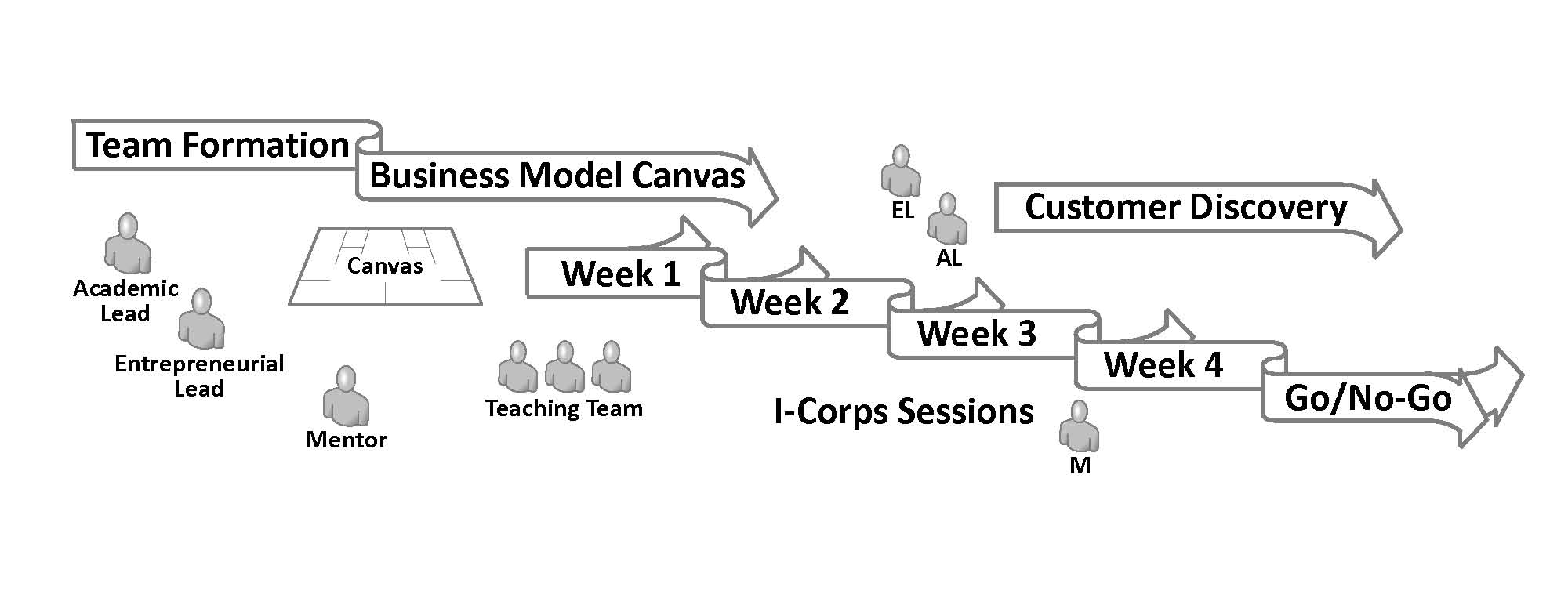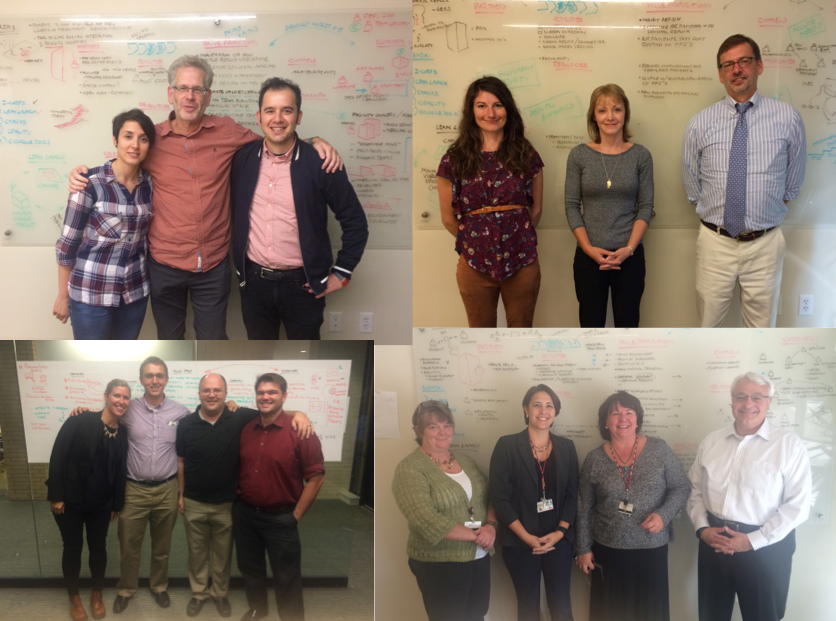The National Science Foundation (NSF) created the Innovation Corps (I-Corps) program to help accelerate the transfer of academic research into the marketplace. The NSF teamed worked with leading entrepreneurs from Silicon Valley to apply the “lean launch” methodology to help faculty-based researchers understand markets for their technologies. In 2015, UW-Milwaukee and the UWM Research Foundation were awarded a three-year grant from NSF to bring this important program to Milwaukee, creating the first NSF I-Corps Site in Wisconsin. The Southeastern Wisconsin I-Corps Site fosters commercialization of applied academic research and faculty/student innovation; builds innovation/commercialization networks that supports faculty and/or student ventures; and broadens the pool of students and faculty fluent in Lean LaunchPad (LLP) methodology.
Process:
The program consists of a four-week workshop (five Monday nights, 6-8 P.M.) where participants are coached on designing and validating a business model around their idea using Lean LaunchPad Methodology. The last session will be dedicated to team presentations on lessons learned and a closing reception. Upon completion, each team will have to decide whether to proceed with the idea (“go”) or regroup/pivot (“no-go”). The program provides:
- Education: five LLP workshops on customer discovery
- Mentoring: via I-Corps Site’s entrepreneurial network
- Mini-grant: up to $2,000 can be used for prototyping materials, travel, and other business expenses for teams from affiliated academic institutions
- Continuing commercialization support and follow-up
I-Corps Site team ideas or projects can originate from student work, research (funded or unfunded), institutional- or industrial projects. The program encourages projects with a focus in an area(s) of science, technology, engineering, or mathematics. However, all types of projects will be considered.

Lean LaunchPad Methodology:
The Lean LaunchPad methodology consists of three elements: the business model canvas, the customer discovery process and the minimum viable product (MVP). The business model canvas is a shorthand way to frame the key elements of your business. Based on the canvas the teams can frame questions (or hypotheses) to test during the customer discovery process. The minimum viable product refers to the minimum feature set that will get your customers to buy the product. Defining the MVP helps early stage businesses to build only the most important features in a product.
Business Model Canvas is a strategic management and lean startup template for developing new or documenting existing business models. It is a visual chart with elements describing a firm, company, or product’s value proposition, infrastructure, customers, and finances. It helps to align business activities by illustrating potential trade-offs.
Customer discovery is a central aspect of the Lean LaunchPad process. In the course of this program you will be challenged to conduct 40 high-quality, face-to-face interviews employing the techniques developed in this course. This program will help participants to develop and practice the tool to ask questions in a way that gets to meaningful answers about your potential business model.
The minimum viable product refers to the minimum feature set that will get your customers to buy the product. Defining the MVP helps early stage businesses to build only the most important features in a product, and, more importantly, avoid wasting money building features that the market doesn’t really want or won’t pay for.
Teams:
Teams are composed of three members who can be students, post-docs, staff, faculty, alumni, or members of the local entrepreneurial community.
Entrepreneurial Lead (EL) is a post-doctoral scholar, a student, professional staff, or alum of one of the partnering academic institutions with relevant knowledge of the technology and a deep commitment to investigate the commercial landscape surrounding the innovation.
Academic Lead (AL) will be responsible for overall project management. The AL will preferably have an academic appointment that would normally qualify the AL to submit proposals or play the role of a PI in subsequent submissions to NSF. The AL can also be post-doctoral scholar, a student, professional staff, or alum provided that person has a deep understanding of the technology that serves as the focus of the project.
Additionally, teams will have a Mentor (M), who can either apply as part of the team or be provided by the I-Corps Site. A Mentor will typically be an experienced or emerging entrepreneur with experience in transitioning technology out of academic labs. The Mentor will be responsible for guiding the team forward and tracking progress.
*The I-Corps Site will find mentors for teams that do not have them.

The Go/No-Go Decision:
The objective of this program is to get to a go/no-go decision on the business model as defined by your initial business model canvas. The program is not intended to validate your technology or help you actually organize and launch a business. Rather the outcome is a simple decision about whether the business as defined appears to be viable.
Teams will be asked to make a go/no-go decision in the last meeting. A “no-go” is not a failure – in fact, it is a success. Determining that a model won’t work will help the teams avoid wasting time (and possibly money) on building something that isn’t viable as a business. From a “no-go” decision, teams may “pivot,” redefine their business model and repeat the customer discovery process. For teams that make a “go” decision, the program organizers will help connect them with resources to help them make the next appropriate step.
Regardless of the go/no-go outcome, teams will develop valuable skills in discovering the market – skills that will inform their research, business and careers.
Timeline:
Meeting Location – all meeting will be held in the UWM Innovation Accelerator located at 1225 Discovery Parkway, Wauwatosa. Plenty of parking is available, and light refreshments will be available during the evening sessions.
ENROLLMENT IS NOW OPEN.
Application Deadline: Rolling Admission
Session Dates: 3/25/19 – 4/25/19
